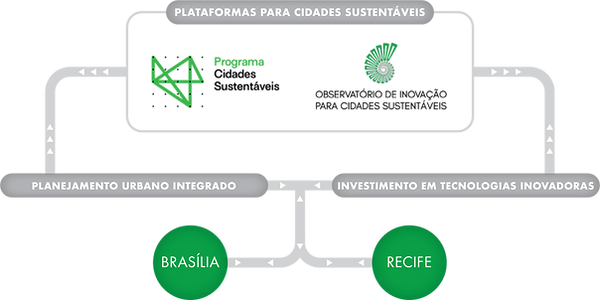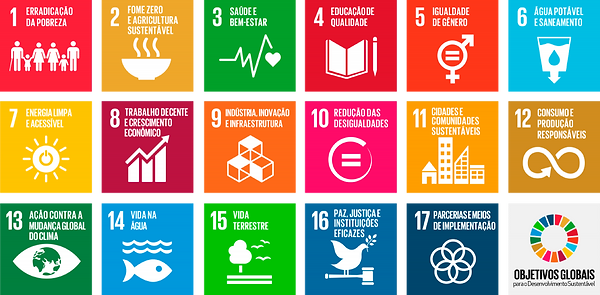
SUSTAINABLE CITIES PROGRAM

The Sustainable Cities PROGRAM (PCS) is an urban sustainability agenda that incorporates social, environmental, economic, political and cultural dimensions into municipal planning. Since 2012, PCS has been involved in raising awareness and mobilizing local governments to implement structuring public policies that contribute to fighting social inequality and building fairer and more sustainable cities. Structured in 12 thematic axes, aligned with the United Nations' Sustainable Development Goals (SDGs), the program offers tools and methodologies to support public management and integrated urban planning, as well as mechanisms for social control and encouraging citizen participation.
Innovation, sustainable development and urban renewal
The CITinova Project offers the most advanced content, technological solutions and collaborative tools to promote integrated, inclusive, participatory and sustainable public management.
CITinova is a multilateral project carried out by the Ministry of Science, Technology and Innovation (MCTI) to promote sustainability in Brazilian cities through innovative technologies and integrated urban planning. With funding from the Global Environment Facility (GEF), this project is implemented by the United Nations Environment Program (UNEP) and executed in partnership with the Recife Agency for Innovation and Strategy (ARIES) and Porto Digital, Center for Management and Strategic Studies (CGEE), Sustainable Cities Program (PCS) and Secretariat for the Environment (SEMA/GDF).
The main objectives are to develop innovative technological solutions and offer methodologies and tools for integrated urban planning to support public managers, encourage social participation and promote fairer and more sustainable cities.
With a duration of four years, from 2018 to 2022, the project is composed of three major fronts of action:
Integrated Urban Planning
Production of knowledge and tools for integrated management of public policies and social participation to create sustainable cities in Brazil. Accessible to public managers and society in general, the new systems will help, facilitate and strengthen local governance.
investments in
Innovative Technologies
Pilot projects in Brasília and Recife to face historic challenges faced by residents and public management in the areas of water, waste, energy, climate change and mobility. The results will serve as a model to be replicated on a large scale by public managers across the country.
Platforms for Sustainable Cities
Virtual spaces to support and promote integrated and sustainable public management: the new platform of the Sustainable Cities Program (PCS) it's the Innovation Observatory for Sustainable Cities (OICS) , carried out by the CGEE.
The General Coordination of Science for Biodiversity, of the Department of Natural Sciences, of the Secretariat for Research and Scientific Training, of the Ministry of Science, Technology and Innovations, is responsible for carrying out the CITinova. This project has a resource of US$25 million from the GEF Global Fund and a counterpart of US$195 million from the partner institutions involved.
Global Fund for the Environment
(GEF – Global Environment Facility) is a financing mechanism designed by the United Nations (UN) and the World Bank at ECO-92, in Rio de Janeiro, to support joint projects by governments and organizations around the world.
Since 1992, the GEF has funded more than 4500 initiatives in 170 countries through structured global programs focusing on climate change, water, waste, land use and biodiversity, among others.
GEF-6 IAP
It is a program created by the Fund specifically for cities in developing countries, with the aim of modeling and strengthening a systemic and integrated approach to urban space planning.
Present in 28 cities and 11 developing countries, including Brazil with the CITInova Integrated Planning and Technologies for Sustainable Cities Project.
New Urban Agenda, Agenda 2030 and SDGs
THE New Urban Agenda (NAU), adopted at the 2016 Habitat III conference in Quito, Ecuador, establishes guidelines for the sustainable urban development of cities and municipalities by 2036. The implementation of the New Urban Agenda contributes to the implementation of the Agenda 2030 and for the achievement of Sustainable Development Goals (SDGs).
Representatives of the 193 UN Member States pledged in September 2015 to adopt a global commitment to sustainable development enshrined in the document “Transforming our world: 2030 Agenda for Sustainable Development”.
The 2030 Agenda proposes an action plan based on 17 Sustainable Development Goals (SDGs) and 169 targets for eradicating poverty and promoting sustainable cities.
@ 2019 CITInova. All rights reserved.



